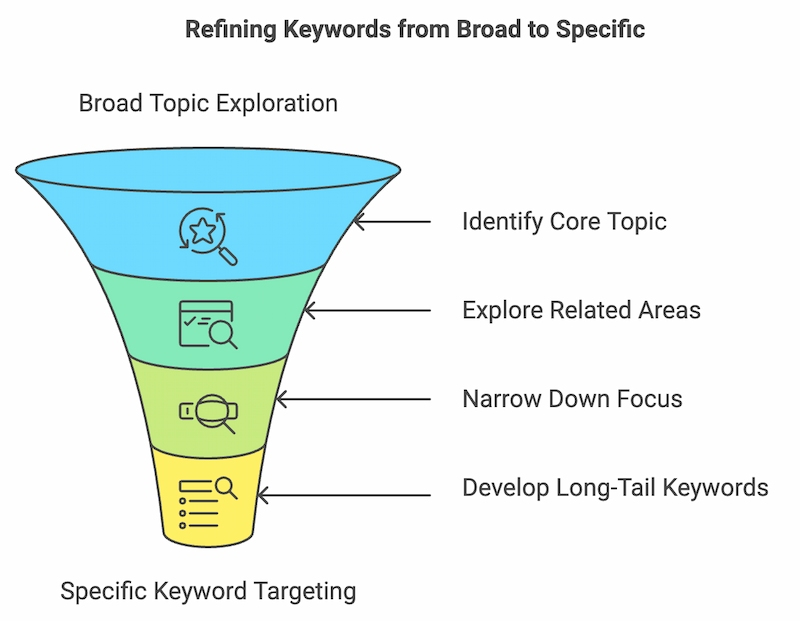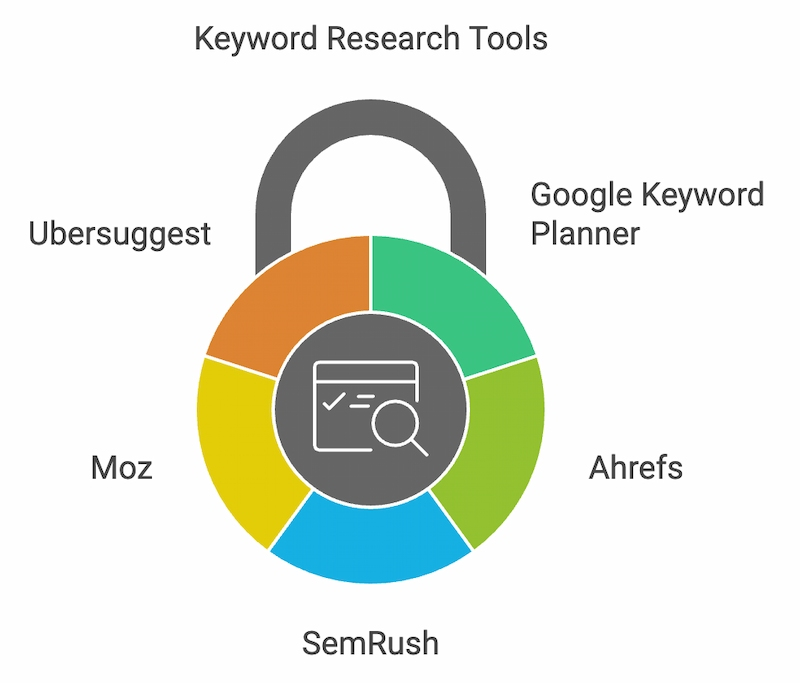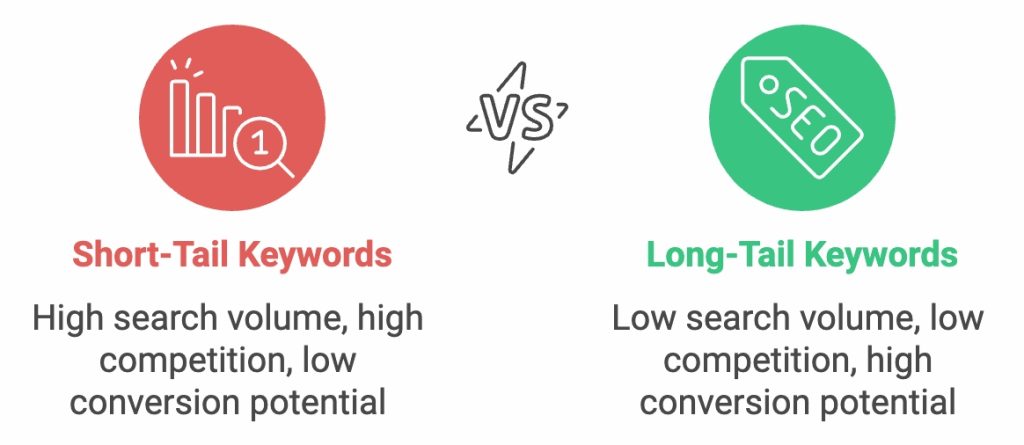10 Keyword Research Tips for Small Business

When it comes to keyword research, even the most seasoned marketers can benefit from a refresher on best practices. Whether you’re diving into Google Ads or crafting content for SEO, finding the right keywords can make all the difference. Especially for small businesses, where every marketing dollar counts.
In this guide, we’ll share 10 expert tips that can help small businesses to elevate their keyword research. These essential keyword research tips will cover different types of keywords, tools and strategies to help you get the most out of your keyword research efforts. Let’s dive in!
1. Understand Your Audience’s Intent

Keyword research isn’t just about picking words—it’s about understanding search intent. Don’t choose keywords based on volume alone, pick keywords that are high-intent.
Keyword research should start with understanding what your audience wants. Are they looking for information, or are they ready to make a purchase? Match your keywords to their intent, whether it’s informational (e.g., “how to do keyword research”) or transactional (e.g., “buy keyword research tools”) or commercial (e.g. “best keyword research tools”) or navigational (e.g. “Ahrefs keyword research tool”).
This alignment ensures you’re attracting visitors who are more likely to engage and convert.
2. Start with Broad Topics and Narrow Down

One of the best ways to find keywords is to begin with a broad topic and then get more specific. For example, if you’re an SEO agency specializing in e-commerce, start with general terms like “e-commerce SEO.”
Then, use tools to drill down into long-tail keywords like “e-commerce SEO for small businesses.” This approach will help you cover the main topic while also capturing niche audiences that are often easier to rank for.
3. Use Competitor Analysis Tools
Analyzing competitors’ keywords is one of the most advanced keyword research tactics you can try. Start by looking at their top-ranking pages and seeing which keywords they’re targeting. Tools like Ahrefs and SEMrush make this process easy.
These insights can help to target terms competitors are already ranking for, as well as identify gaps they haven’t addressed—prime opportunities to fill with your content.
4. Don’t Ignore Low-Volume, High-Intent Keywords
It’s tempting to focus only on high-volume keywords, but sometimes the best keyword research method involves going against the grain. We’ve found that low-volume, high-intent keywords, though less popular, can lead to impressive conversion volume.
Think about terms like “affordable social media software for small businesses.” While the volume might be very low, the intent is high—people searching for this are likely ready to buy. For small businesses looking to get ahead with search – these high-intent keywords can make all the difference.
5. Use Keyword Research Tools Wisely

Keyword research tools are very useful, but don’t let them do all the thinking for you. Tools like Google Keyword Planner, Moz, and Ubersuggest are fantastic for generating keyword ideas and gauging competition.
However, remember to use these insights as a foundation, not as the final answer. Trust your knowledge of your audience and industry to make the best decisions. If you’re looking for different types of keywords—short-tail, long-tail, or LSI—these tools are great to surface new ideas to go after. That being said, some long tail keywords won’t show up in these tools, so you’ll have to trust your gut sometimes.
6. Embrace Long-Tail Keywords
In our experience, long-tail keywords can often outperform short-tail terms because they’re more specific. For example, instead of targeting “digital marketing,” you might use a phrase like “digital marketing strategies for small businesses.”
Long-tail keywords often have less competition, and their specificity attracts users who are closer to making a decision. If you’re focused on keyword research to move the needle, long-tail keywords should definitely be part of your strategy.
7. Create a Keyword Map for Better Organization
When managing multiple keywords across a variety of pages, it’s essential to stay organized. One of the best ways to find keywords and keep track of them is through a keyword map. This document or spreadsheet organizes keywords by theme, helping you ensure they’re spread out and not cannibalizing each other.
This approach also aids in planning content clusters, which boost your site’s topical relevance. When we started using keyword mapping for our clients, we noticed a substantial improvement in rankings since their pages were better optimized, internally linked and no longer competing against each other.
8. Balance Short-Tail and Long-Tail Keywords

There’s a place for both short-tail and long-tail keywords in your strategy. Short-tail keywords help you build authority in a broader sense, while long-tail keywords target specific needs.
When launching a campaign for a client, we’ll start with some strong short-tail keywords to drive volume and layer in long-tail keywords for conversions. This balanced approach maximizes visibility and engagement, especially if you’re running a PPC agency with a variety of client needs.
9. Keep Revisiting and Updating Your Keyword List
The world of SEO and Google Ads is always evolving, which means your keywords can’t stay stagnant. Regularly update your keyword list based on new trends, competitor shifts, and changes in search volume.
As your audience and Google’s algorithm changes, so does the performance of your keywords. Periodically refreshing your list ensures you’re staying relevant and targeting the best keywords for your goals.
10. Use Negative Keywords in Your Campaigns
If you’re using Google Ads, don’t overlook the power of negative keywords. These are keywords you exclude to avoid showing your ads for irrelevant searches. They’re a huge help in optimizing ad spend and driving qualified traffic.
For instance, if you’re advertising a premium service, you might want to add “free” or “cheap” as negative keywords. This tactic prevents your ad from appearing for users unlikely to convert.
Conclusion
Effective keyword research is the cornerstone of successful search marketing. For small businesses, it’s not just about choosing popular keywords—it’s about selecting the right ones that align with your audience’s intent, balance competition and maximize your budget’s impact.
By applying these 10 keyword research tips for small businesses, you can sharpen your keyword strategy and create a strong foundation for both organic and paid search campaigns. From understanding your audience’s intent to embracing long-tail keywords, leveraging tools, and continually optimizing, each step helps you move closer to your marketing goals.
Remember, keyword research isn’t a one-and-done task; it’s an ongoing process. Stay curious, keep testing, and adapt your strategy as your business grows and the digital landscape evolves. With the right approach, your small business can stand out and thrive in search results.
If you’re looking for help with picking the right keywords, please don’t hesitate to get in touch, we’d love to chat.
